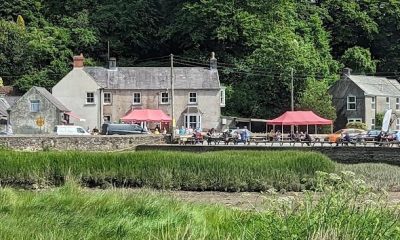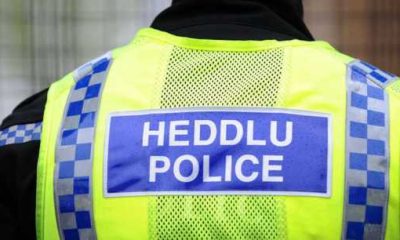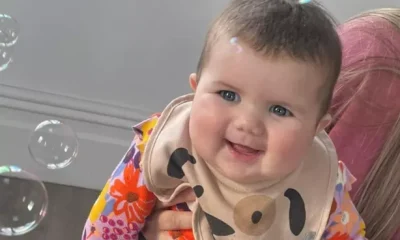News
Caldey Island: 6-year-old who drowned in 1977 was victim of abuse, says sister

EXCLUSIVE by Amanda Gearing
A WOMAN whose sister drowned off Caldey Island in 1977 as a 6-year-old child says they were both sexually abused by a monk there.
Father Thaddeus Kotik, who lived at Caldey Abbey for 45 years before his death in 1992, is accused of abusing several girls in the 1970s and 1980s.
Joanna Biggs, 48, is the first of Kotik’s alleged victims to waive anonymity to speak out about her ordeal. She has revealed that is well as being victim to sexual abuse – her sister was blamed for her own death.
Reading the shocking revelations that a monk had abused several children on Caldey Island in the 1970s and 1980s broke open a kaleidoscope of traumatic memories for Joanna Biggs.
Memories of abuse by Father Thaddeus Kotik of herself and her younger sister, Theresa; memories of the last day she spent with Theresa playing on Sandtop Bay on Caldey Island; memories of a grey nun’s veil blowing in the wind and the panicked look on the nun’s face when Theresa was swept out to sea and drowned on 18 July 1977.
Joanna Biggs told her siblings about the abuse in recent years but she has now also told her grieving parents of her abuse by Fr Thaddeus and that their daughter who died was also a victim of abuse.
Joanna Biggs has been affected by the abuse herself – not being able to drink milk for decades because of the smell that reminds her of the dairy where the abuse happened.
But it is the drowning of her younger sibling Theresa that has compelled Joanna Biggs to research the facts surrounding her sister’s death and to publicly defend Theresa’s honour against what she believes to be false evidence given to the inquest.
A nun, Sister Sheila Singleton, who was caring for a group of children at the beach on Caldey Island, claimed in evidence that she had forbidden Theresa to swim and that Theresa had disobeyed her by going in the water.
“This is not true,” Joanna Biggs said. “The nun asked me to help her blow up Theresa’s armbands so I showed her how to do that.”
“[The nun] helped put Theresa’s armbands on. And then she said ‘off you go’.”
“My sister was not naughty. I was told she was found with one of her armbands on.”
Theresa’s father John Biggs strongly supports Joanna’s desire now to have the truth revealed in the hope of bringing a proper closure for the family over his daughter’s death.
John Biggs said he and his wife “never believed that Theresa wilfully disobeyed but were not there to prove it”.
Joanna Biggs said her parents had lived with the nun’s lie for more than 40 years. “It is time for my sister to be released from false blame,” she said.
“My sister was more adventurous and more assertive than me,” she said.
Even at six years old it was Theresa who made sure that they escaped further abuse by Fr Thaddeus, she said.
“My sister made a pact with me that we would never be alone with Fr Thaddeus even if he offered us sweets.”
After speaking with her elderly parents, Joanna Biggs searched the Pembrokeshire Archives to unearth the inquest file that her parents had always been too traumatised to read.
Theresa’s father attended the inquest but her mother, who had a very young baby at the time, was not able to attend.
The inquest documents show the drowning was investigated in one day and the inquest was held the following day, just two days after the drowning.
At last answers are being found. Joanna Biggs is now determined to correct the record so that her little sister can be remembered as the obedient child she was raised to be by her devout Catholic parents.
Sister Singleton did not give evidence in person but she made a statement to the court claiming that she “told Theresa she was not to go into the water as it was too cold” and that Theresa had disobeyed her direction and went swimming without permission.
Sister Singleton said she saw Theresa “going towards the water” and asked one of the boys to look after her.
“It seemed only minutes had passed when some of the boys shouted [to] me. I understood something had happened to Theresa,” Sister Singleton wrote.
But teenagers at the beach gave evidence that the nun had allowed a large group of children to swim in a force 5 to 6 gale at a beach with dangerous ocean currents, put floaties on Theresa, 6, led her to the water’s edge and asked a boy of 14 to look after her in the water.
A boy of 14, James Donnelly, gave evidence that Sister Singleton had made her way towards him with Theresa – who was wearing inflated armbands – and asked him to take the girl down to the water.
James Donnelly told the inquest that he went in the water with Theresa, leaving her playing in shallow water while he went out to deeper water.
James lost sight of Theresa, saw that she had been swept into deeper water and tried to reach her with help from another boy, John Lewis, 12, who had come to help.
John reached her and Theresa held onto him and told him “Don’t let go of me”, but he said she was pulling him under the surface and they were both swallowing water.
John said he pushed the girl’s arms away so he could get out of the water and get help.
Theresa was swept further out and was waving her arms and screaming. Another boy, Anthony Bonar, 15, swam towards her but could not reach her because the current was too strong.
By then Anthony said he could only see two orange armbands floating on the water and the girl’s arms waving in the air.
“Her head was under the water,” he said.
The coastguard was called and retrieved the girl’s body. A doctor who met the rescue boat at the slipway pronounced her dead.
The coroner accepted the nun’s evidence over that of the three boys.
Theresa’s family would like to see the inquest re-opened so that the evidence of the boys can now be accepted and so the brave efforts of the boys to save Theresa can be recognised.
Joanna Biggs has also confirmed that a group of monks was standing on the rocks praying.
“None of them gave evidence to the inquest,” she said.
In addition, the abbot of Caldey Abbey and a parish priest Father David Bottrill were on the island at the time.
“I know that the abbot rang our home and told my father that Theresa was dead,” Ms Biggs said. “My family has only just become aware that there were monks present on the beach.”
What still weighs on Joanna Biggs’ mind after 40 years is that three boys battled dangerous swell and undercurrents to try to rescue a child while adults on the beach and on the rocks did not give practical help.
“This was a heavy enough burden for these children to carry for the rest of their lives. But on top of this, there was no mention in the inquest about the actions of the adults who were present that day – except for the false statement of Sister Sheila,” she said.
“Questions need to be asked – Why were any children at all allowed to swim on such a dangerous beach that day? Why did no adult enter the water to try to assist the boys?” she said.
Joanna Biggs also questions why no adequate warning signs about dangerous tides were erected before or after her sister drowned.
“Whenever my family visits my sister’s grave on Caldey Island it distresses us to see there are still no adequate warning signs of the dangerous underwater currents at Sandtop Bay,” she said.
The Herald sought comment from Sister Singleton but the Irish religious order to which she belonged, the Congregation of the Little Sisters of the Sisters of the Assumption, has confirmed that Sister Singleton died in 2004.
- Do you have any further information? Please email the journalist: Amanda Gearing.
Community
Public reminded to stay away from Ward’s Yard and Criterion Quay

THE PORT of Milford Haven is reminding members of the public to stay away from Ward’s Yard in Milford Haven and Criterion Quay (sometimes known as the offshore jetty) in Pembroke Dock due to concerns over public safety.
Despite significant security measures, people continue to access the sites illegally, ignoring and sometimes damaging the onsite signage and fences.
Niall Yeomans, Head of Health, Safety and Security at the Port of Milford Haven said: “Safety is our key priority. Members of the public are continuously putting themselves and members of our team at risk of serious harm by trespassing in these areas.”
“Both Ward’s Yard and Criterion Quay are unsafe for public access. They are isolated areas next to deep water and are susceptible to slips, trips and falls.”
Both sites are owned by the Port of Milford Haven and are private property. Anyone found onsite without consent is trespassing, and any criminal damage could result in prosecution.
Anyone who sees any suspicious activity at Ward’s Yard or Criterion Quay is asked to contact Dyfed Powys Police on 101 urgently.
Crime
‘Sophisticated’ organised crime gang trafficked cocaine and cannabis to Aberystwyth
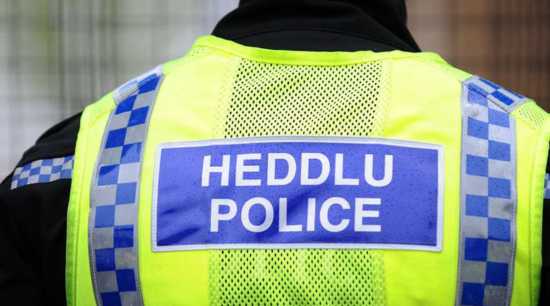
FIVE people have been found guilty or admitted to conspiring to supply cocaine and cannabis as Dyfed-Powys Police continues its efforts to dismantle organised crime gangs.
Officers seized cocaine with a street value of more than £400,000 from gang members, who continually changed tactics to avoid arrest.
Six defendants have appeared in court in the latest phase of Dyfed-Powys Police’s Operation Burleigh, which sought to disrupt the trafficking and onward supply of class A and B drugs into Aberystwyth, with all but one admitting their charges or being found guilty by a jury.
This brings the total number of people awaiting sentence under the operation to 15.
The court heard that officers from Dyfed-Powys Police’s Serious and Organised Crime Team and Ceredigion Priority Policing Team led the investigation into the OCG, which was described as ‘sophisticated, well-organised and evolving’.
Detective Sergeant Steven Jones said: “This conspiracy operated on a County Lines model, where controlled drugs are trafficked into a smaller rural town from a larger city, and the operation is controlled by one or more ‘drugs lines’.
“In this case there were a total of four lines controlling the supply of cocaine and cannabis within Aberystwyth.
“The conspirators frequently evolved their actions to frustrate the authorities and evade capture.”
The OCG embedded members were mainly asylum seekers brought to Aberystwyth by Toana Ahmad and another man who remains outstanding, with the sole purpose of dealing drugs. The drug lines were initially based in Swansea, and later in areas of Birmingham.
Three properties – on Terrace Road, Alexander Road and Parc Graig Glas – were identified early in the investigation as being used to house the OCG members embedded in Aberystwyth. Substantial amounts of cash, controlled drugs and weapons were recovered from these properties, and from the people found inside.
When arrests were made, the gang changed its tactics. Drugs began to be supplied from vehicles, and OCG members stayed in guest houses to avoid detection.
DS Jones added: “Trusted couriers were employed to transport drugs to Aberystwyth and cash back to Birmingham or Swansea. A number of vehicles, including taxis, were used as the gang attempted to avoid detection along the route, while trains were also taken when courier cars were stopped by officers.”
In June 2023, two vehicles travelling from the West Midlands towards Aberystwyth were stopped by police on consecutive days. A black sock was uncovered in the engine of the first car, which was found to contain 82g of high purity cocaine divided into 169 grip seal plastic bags.
Davinder Singh, who previously pleaded guilty to conspiracy to supply class A and class B drugs, was the driver of the second vehicle, which was a taxi. A blue plastic bag was seen falling out of his shorts, which contained over 81g of high purity cocaine divided into 167 grip seal bags.
DS Jones said: “On the basis that the amounts of cocaine transported over the 37 couriers over the course of the conspiracy period were similar, over 3kg of cocaine would have been conveyed to Aberystwyth from Birmingham.
“This equates to class A drugs with a potential street value of over £308,950. In addition to this, class A drugs were seized from individuals and addresses with a potential street value of £103,445, along with cash totalling £11,687.
“A number of teams and departments across Dyfed-Powys Police, from analysts, CCTV operators and priority policing teams, to CAB, the Technical Support Unit, Economic Crime Team and Force Intelligence Bureau all assisted in dismantling the OCG from top to bottom.
“Their dedication and relentless efforts have assisted in making Aberystwyth a safer place to live without the threat and harm of drugs being made easily available on the street.”
After a seven-week trial at Swansea Crown Court earlier this year, the following three defendants were found guilty for their parts in the conspiracy:
- Toana Ahmad, aged 33, of Lee Gardens in Smethwich, West Midlands
- Barzan Sarhan, aged 31, of no fixed address
- Ahmed Piro, aged 26, of no fixed address
The jury failed to reach a verdict on two defendants during the earlier trial. They have been subject to a retrial starting on July 1, with the following outcomes:
- Hawre Ahmed, aged 35, of Pinderfields Road, Wakefield, West Yorkshire, was found guilty by the jury of conspiracy to supply Class A and B controlled drugs.
- Diar Yousef Zeabari, aged 35, of Flat 5, 41 Bryn Road, Swansea, was found not guilty of conspiracy to supply Class A and B controlled drugs.
Karwan Karim, aged 39 of 125 Griffith John Street, Swansea, also stood trial, and pleaded guilty to conspiracy to supply Class A and B controlled drugs on day three.
In addition to the OCG members found guilty during the most recent trials, the following have previously pleaded guilty to charges of conspiracy to supply class A and class B drugs under Operation Burleigh:
- Davinder Singh, aged 36, of Huntingdon Road, West Bromwich
- Daban Khalil, aged 23, of Streetly Road, Birmingham
- Kastro Omar, aged 30, of Junction Road, Northampton
- Karwan Jabari, aged 26, of Weedon Close, Northampton
- Walid Younis Abdal, aged 34, of St Anne’s Road, Doncaster
- Saman Aziz, aged 41, of Kirk Road, Merseyside
- Adel Mustafa, aged 39, of Hubert Road, Newport
- Charlotte Roberts, aged 21, of Sutton Hill, Telford
The following have previously pleaded guilty to conspiracy to supply class A drugs:
- Akasha Smith, aged 24, of Third Avenue, Aberystwyth
- Luqman Jarjis, aged 21, of Wake Green Road, Birmingham
News
Community asked for views on allocation of new St Davids homes
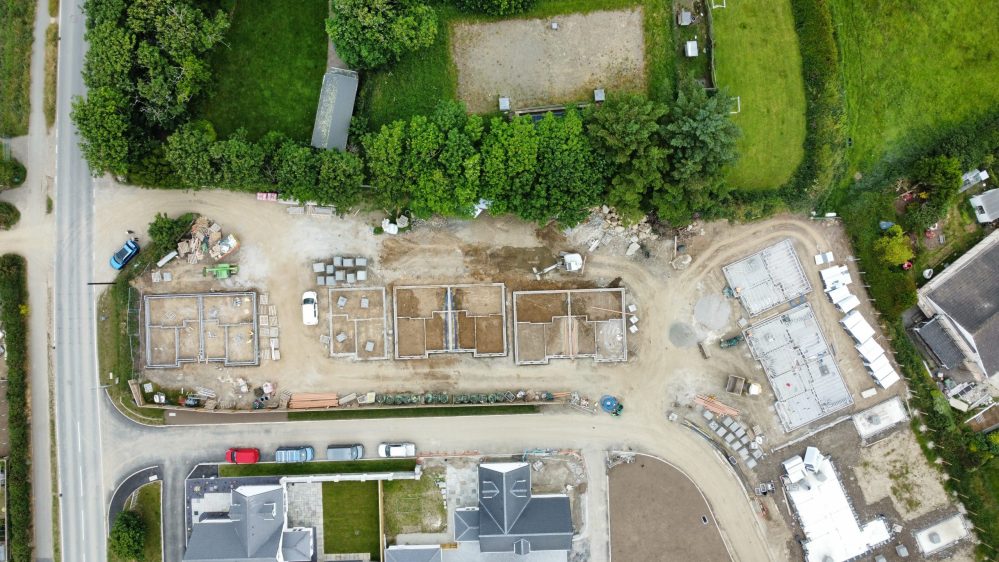
THE FIRST phase of Pembrokeshire County Council’s Glasfryn housing development in St Davids is progressing well with the second phase also underway.
The development being built by GRD Homes Ltd, began in November 2023, with a first phase completion date of Winter 2024 looking hopeful, ahead of the scheduled plans.
The first phase consists of seven properties, including a mixture of one and two bedroom bungalows
As completion draws closer the properties will be advertised via Pembrokeshire Choice Homes.
Ahead of this, the Council’s housing team will be holding community engagement on the 13th August 2024 at the Ty’r Pererin Centres, Quickwell Hill, St Davids, SA62 6PD, 5pm-7pm.
This will be a chance for officers to liaise with the local community about the allocation process for these properties.
Glasfryn’s second phase is well underway, with the initial groundwork already completed. This phase includes a further 11 two bedroom bungalows, with a completion date in late 2025.
These bungalows will meet the latest Welsh Government’s Development Quality Requirement, and will be energy efficient, built to EPC A specification and include solar panels to help tenants with running costs.
The Glasfryn development is funded in partnership with Welsh Government.
Cabinet Member for Housing Cllr Michelle Bateman said: “We are really keen to work with the community on a local lettings policy for these new properties, as we have done for our developments in other parts of the County.”
If you have any queries please email the Customer Liaison Team on [email protected], phone them on 01437 764551, or visit Housing’s Facebook page.
-

 Education5 days ago
Education5 days agoMilford Tesco worker achieves Oxford dream and lands top legal job
-

 Crime4 days ago
Crime4 days agoHaverfordwest man admits having nearly 1000 child and animal images
-

 Crime4 days ago
Crime4 days agoYouth set to appear in court over serious sexual offences
-

 Crime4 days ago
Crime4 days agoPolice investigating after man injured during altercation in cemetery
-

 Education4 days ago
Education4 days agoPupils delight in ice cream treat from Pembrokeshire’s number one van
-

 Crime4 days ago
Crime4 days agoTown centre ‘stinking of skunk’ as police strip cannabis farm
-

 Crime3 days ago
Crime3 days agoFag-butt police court summonses spark debate in Pembrokeshire
-

 News6 days ago
News6 days agoProposal to give firefighters a council tax discount to go to Cabinet






